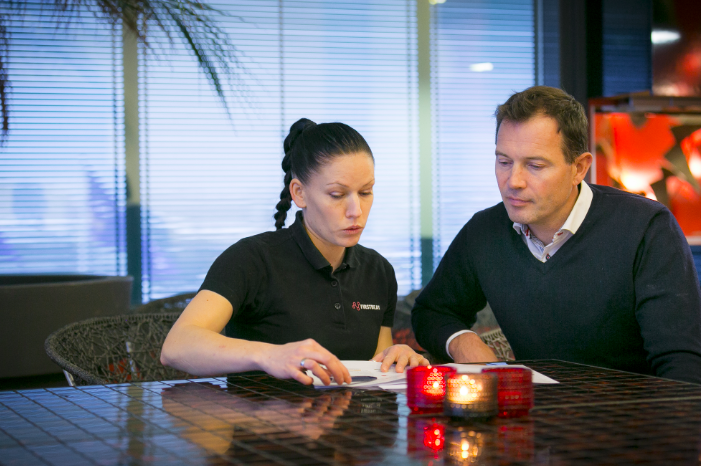
- BLOG
- Interview
The Kamwell Interview: Tim Wright, Firstbeat UK
Kamwell interviews Tim Wright, Commercial Director of Firstbeat UK. We talked to Tim about all things wellbeing, heard his fascinating stance on the topic of stress and discussed the future of wearable technology in the wellbeing sphere.
KW: After almost 20 years in the industry, we are interested to hear how you would define the term ‘wellbeing’.
TW: Wellbeing, to me, means taking a holistic, 360 degree view of your lifestyle. I like to think of this in terms of four pillars: movement/exercise/mobility; mind/psychological; nutrition; and restoration/sleep/recovery. All these areas play a role in our wellbeing and should be looked at together.
KW: The topic of employee wellbeing, seems to be making its way into mainstream knowledge via some high profile press coverage, where do you see this specific field going in the coming years?
TW: Over the years I have seen many different approaches to wellbeing and I now see us moving more towards an integrated wellness proposition that takes the four pillars into account. I think we will increasingly utilise data to make strategic wellness decisions and to measure the effectiveness of interventions.
KW: Ok, with that in mind, what do you think it takes to be successful within the wellbeing industry?
TW: I think those who have been successful in the wellbeing industry understand that we’re not looking for a panacea, a magic pill, a quick fix…rather we need to think about incremental changes on a frequent basis over a realistic period of time.
“Selling something based on risk…that’s not interesting”
KW: Thinking about Firstbeat’s success…90% of those who have undertaken the Lifestyle Assessment would recommend it - that’s great feedback. What do you think this can be attributed to?
TW: The Firstbeat Lifestyle Assessment is only as good as the person who is delivering the coaching. It is the human element that enables us to help people make changes that other technology cannot. This, combined with the quality of our data, makes for a powerful approach. People get a deeper understanding of what is going on in their body and how their environment is affecting them. This means they can change things. I also think that if you sell something based on risks, for example: the chance of getting heart disease, it’s not that interesting. But if the premise is to get more energy, have more vitality, have better resilience…people want to buy into that.
KW: Is there a danger with wearable tech that data is seen as more important than a person’s account of their wellbeing?
TW: Data shouldn’t be looked at in isolation. The Firstbeat Lifestyle Assessment is a coaching tool. Part of the assessment is a wellness questionnaire to get an idea of a person’s perception of their wellness - this can be very aligned to their physiology, or very far away from it. As humans we have a good instinct of what’s working and what isn’t but we aren’t always 100% right. So I think data supplements a personal account, rather than replaces it.
KW: Progress within the world of wellness technology seems to be very fast, with the explosion of artificial intelligence, virtual reality….how will Firstbeat continue to innovate?
TW: The strength of our offering is around the analytics, the customer journey, the data and the reports. There will be technology that comes and goes…trends that come and go, but we’ve stood the test of time and I feel we’re in a good place. We’re not a self-monitoring device such as Fitbit or Jawbone, we’re a coaching device…it’s different. But competitors enhance your product so we’d encourage more competitors!
“Stress is not necessarily a bad thing”
KW: Part of what Firstbeat focusses on is identifying aspects of a person’s lifestyle that cause stress - what effect do you think stress is having on today’s society.
TW: Firstly, stress is not always a bad thing….it is a normal physiological response and there are a lot of misconceptions about what it is. Acute stress can make you perform well and within a healthy overall lifestyle it’s not necessarily a problem. The issues come when you have chronic stress imbalanced with poor recovery. From my perspective, I want to teach people that a stressful event is manageable and not damaging, especially if over a 24 hr period you’re getting great sleep, great recovery. That’s what’s more important.
KW: On the topic of lifestyle and stress, can you tell us what you do to ensure your optimum health and wellbeing?
“I turn my phone off at 19:30”
TW: Understanding what triggers responses from a physiological point of view has dictated what my behaviours are. I’ve learned many things as a result of doing the Firstbeat Lifestyle Assessment is. A big one is how precious sleep is - that’s where we refuel the tank. I have worked hard on my sleep environment…light, temperature, humidity. I turn off my phone at 19:30 so I don’t get any blue light in the evenings. I also don’t work after this point. I don’t eat meat in the evenings because it affects my quality of sleep - this is something the Lifestyle Assessment uncovered. I need to do more higher intensity exercise and I have found that this is most effective in the morning - it can affect my sleep in the evenings. I tend to make sure that I incorporate social aspects into the week - catching up with an old friend, reaching out to my social circle, doing something that is completely changing my mind-set. And I make sure I have plenty of cuddles with my wife and son because that instils the best parasympathetic response!

Tim Wright
